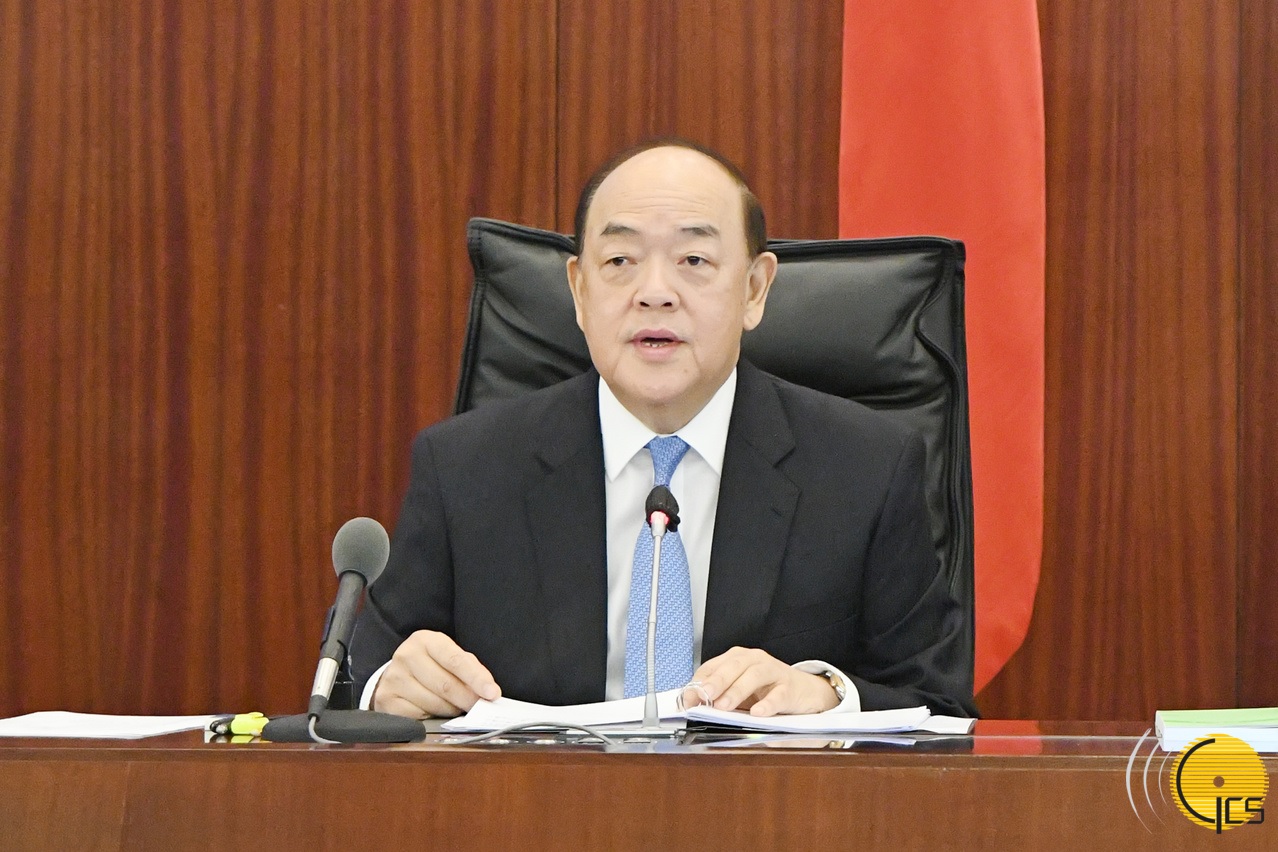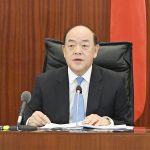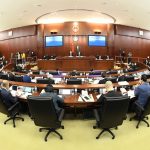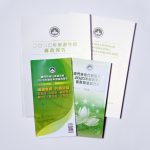 The Chief Executive, Mr Ho Iat Seng, delivers the Policy Address for the Fiscal Year 2020 at the Legislative Assembly.
The Chief Executive, Mr Ho Iat Seng, delivers the Policy Address for the Fiscal Year 2020 at the Legislative Assembly.
The Chief Executive, Mr Ho Iat Seng, today said the overall direction of the public policies implemented in the remainder of 2020 would be: fighting the pandemic, safeguarding employment, stabilising the economy, caring for local people’s livelihoods, implementing reform, and facilitating development.
Mr Ho delivered this afternoon at the Legislative Assembly the Policy Address for the Fiscal Year 2020, titled “Forging Ahead Towards New Horizons”. In it Mr Ho outlined eight major strands to public policy.
The Government expected 2020 would see a deficit in the public budget, the first such occasion since the establishment of the Macao Special Administrative Region (SAR). Mr Ho said the Government had committed itself to spending over 50 billion patacas in response to the COVID-19 pandemic.
Ongoing work to fight the pandemic – and thus to maintain community stability and to boost conditions for the post-pandemic economic recovery – was the first policy strand mentioned in the Policy Address. Mr Ho detailed four parts to that, designed to maintain stability and to step up economic recovery.
The first portion of the first public-policy strand involved increasing input regarding infrastructure. Such effort included the need to: expedite public construction projects to create job opportunities; commence construction of the fourth Macao-Taipa cross-harbour route; and expedite construction of the Light Rapid Transit (LRT) system. Other infrastructure tasks were to; implement construction of public housing in New Urban Zone Area A, as construction of Home-Ownership Scheme housing units in Lots B4, B9 and B10 was set to begin; commence reconstruction of certain facilities of the Taipa Ferry Terminal which to be integrated with the second passenger terminal at the city’s airport; and to conduct a public consultation before year-end on Macao’s urban development master plan.
The second portion of the first policy strand was to foster the recovery of the integrated tourism and leisure sector. The Government would launch tourism incentive programmes once the COVID-19 pandemic was under control. When appropriate, the Government would approach the Central Government asking it to resume the issuance of permits for travel from mainland China to Macao. Macao would also negotiate with Guangdong Province on steps for relaxation of the current re-entry requirements applicable to Guangdong residents returning to the province after a visit to Macao.
The Government would in due course launch for Macao residents tourism activities, such as "local tours" and "tours to Hengqin and neighbouring areas", and organise a greater number of festive events.
The Chief Executive said the Macao Government Tourism Office would be transferred to the portfolio of the Secretary for Economy and Finance, in order to create synergy between public policy on tourism and other economic activities.
The third portion of the first public policy strand was to encourage private investment and to intensify effort to solicit investment. The Government would provide greater support to mainland China enterprises that aimed to explore international markets, in order to help them establish regional headquarters in Macao. The Government would expedite approval procedures for private investment projects and construction projects.
The fourth portion of the first public policy strand would be support for small- and medium-sized enterprises (SMEs). Mr Ho noted the COVID-19 pandemic had posed great challenges to local SMEs and the Government had launched a number of relief measures in order to help them overcome the challenges.
The Government would study, jointly with the business sector, the feasibility of establishing an SME-risk fund, in order to enhance SMEs’ resilience in coping with adversities, said Mr Ho.
During the Legislative Assembly session, Mr Ho said the second public-policy strand in the Policy Address was to press ahead with administrative reforms in order to enhance governance. The aim was to establish a service-orientated modern format for government, incorporating integrity and efficiency, and providing convenient services to the public and to businesses.
The Government would improve the mechanism for implementing the Constitution of the People’s Republic of China and the Basic Law of Macao; improve the legislative coordination mechanism; strengthen legislative planning; and prioritise formulating and amending laws and regulations related to the economy and people's livelihoods.
The Government would strengthen and improve the interdepartmental cooperation mechanism; and coordinate and resolve major cross-departmental issues through administrative meetings between the Chief Executive and the Government Secretaries.
The Government would optimise the structure of public departments, rationalising initially the departments responsible respectively for economic services, tourism, education, and government information.
The Government had set up an Office for the Planning of the Supervision of the Public Assets of the Macao SAR, with a view to enhancing supervision of publicly-funded enterprises and autonomous funds.
The third public-policy strand mentioned in the 2020 Policy Address was regarding relief for those facing hardship in terms of livelihood; and efforts to improve people’s well-being.
Mr Ho said the Government would forge ahead with livelihood-improvement measures related to housing, transportation, healthcare and social security, while adopting a series of welfare measures.
The Government would expedite construction of public housing, in order to ensure a good basic level for the living conditions of local residents; and implement construction of public housing in the New Urban Zone Area A. The Government would also oversee the imminent construction of the Home-Ownership Scheme, involving 3,011 housing units in Lots B4, B9 and B10 in the New Urban Zone Area A.
The Government would develop a reasonable path for home ownership; would start drafting a special law – following public consultation – on defining the housing needs of the middle-income or “sandwich” class, and study the design of housing for senior citizens.
The 2020 Policy Address also mentioned work to expedite amendment of the Home-Ownership Scheme Housing Law.
The fourth public-policy strand mentioned in the 2020 Policy Address was to optimise talent-cultivation policies and strengthen education and youth services.
Mr Ho said the Government planned to set up a high-level vetting committee regarding importation of talent. The Government would integrate public departments dealing with education, in order to optimise development of the field.
The Government would support teaching, scientific research and applied use of research conducted by tertiary institutions; and forge ahead with the construction of the Guangdong-Hong Kong-Macao Greater Bay Area tourism education and training base, the Global Centre for Tourism Education and Training, the International Portuguese Training Centre, and advancing Macao as a centre for cultivating the skills of talented individuals who are bilingual in Chinese and Portuguese.
The Government would set up a patriotic education base in Macao and step up effort to create favourable conditions for the education, employment, participation in entrepreneurship, and general development of young people, Mr Ho said.
The fifth public-policy strand in the Policy Address was to strengthen urban planning for construction of a smart city.
The Chief Executive said the Government would expedite formulation of the Macao urban development master plan and implement urban renewal work and properly manage the integrated use of land resources.
The Government would spare no effort to build a "Digital Macao", and strengthen new infrastructure such as a 5G network and data centre.
Improvement regarding policies concerning the environment, and promotion of green development were also mentioned in the 2020 Policy Address.
The sixth public-policy strand mentioned by the Chief Executive was to foster cultural diversity and promote cultural exchanges.
Mr Ho said the Government should strengthen effort to develop Macao as a multicultural exchange and cooperation base with an emphasis on Chinese culture, while boosting effort to enhance cultural exchanges and cooperation with Portuguese-speaking countries.
Macao would either build anew or improve sports facilities, and organise various international sports competitions and events, Mr Ho said. The Government would support gaming concessionaires and sub-concessionaires in organising a greater number of cultural and sports events, in order to increase their revenues from non-gaming offerings.
The seventh public-policy strand outlined in the Policy Address was to strengthen anti-corruption measures and auditing, in order to ensure a corruption-free and efficient system of government.
The Chief Executive said the Government would ensure a zero-tolerance approach to corruption. The civil service would need to ensure probity and integrity in its work.
The Government would persist in combatting and preventing corruption; enhance education on the topic of integrity; and enhance auditing work to improve public governance, Mr Ho said.
The eighth public-policy strand of the Policy Address was to sustain Macao’s stability and security.
The Government would optimise laws and regulations; management mechanisms; and enforcement mechanisms necessary to safeguard national security. It would also enhance the quality and law-enforcement capabilities of the police forces, and deepen regional cooperation and coordination mechanisms on policing matters.
The optimisation of the contingency response mechanism for public health emergencies and the expedition of legislation on fire prevention and safety; and of regulations regarding dangerous goods, were also part of the Government’s work for 2020.
In addition, the Chief Executive shared his insights on a number of issues, including how to adhere to the “one-country” principle while taking advantage of the “two-systems” model; and how to utilise the Central Government’s policies favouring Macao’s development. He also spoke of the principle of “serving the country’s needs, delivering Macao’s strengths”; and about how to promote healthy development of the gaming and tourism industries while forging ahead with adequate economic diversification.
The 2020 Policy Address also covered topics regarding how to protect employment of local residents while introducing non-local human resources; how to maintain a balance between economic development and enhancement of livelihoods; and how to maintain social stability, economic development and administrative reforms.




